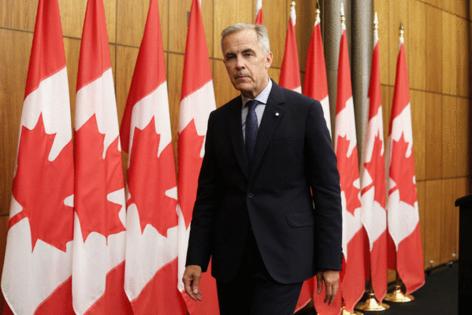Carney tells Ukraine 'Canada will be there' to enforce Russia peace deal
Published in News & Features
Canadian Prime Minister Mark Carney said peace in Ukraine can only happen through strength, and his country will help enforce any deal with Russia — including by potentially sending troops to Ukraine as part of a postwar peacekeeping effort.
Carney visited the war-torn country on Sunday for the first time since being elected this year. He spoke next to President Volodymyr Zelenskyy in Kyiv’s Sophia Square on Ukraine’s Independence Day, before the two leaders held a bilateral meeting and news conference.
In his speech, Carney described Russian President Vladimir Putin’s 2022 invasion, now halfway through its fourth year, as a “horrific act of aggression, a maniacal quest to recreate a history that itself was filled with injustice.”
Putin, who’s “broken his word repeatedly,” can’t be trusted, so true peace requires security guarantees for Ukraine provided by allies, he said.
Carney said Russia’s economy is weakening, with Putin become more isolated, and the alliance of nations that support Ukraine hardening. “I applaud the leadership of the transformative U.S. President Donald Trump in creating the possibilities for peace,” he added.
Also attending events in Kyiv on Sunday were U.S. General Keith Kellogg, presidential envoy for Ukraine — who met with Ukrainian Prime Minister Yuliya Svyrydenko — and defense ministers from Sweden, Latvia and Denmark, while Trump sent a message of support that was shared by Zelenskyy on social media.
Carney and Zelenskyy signed a joint communique calling for an immediate and unconditional ceasefire as a first step toward the peace process.
Any peace accord with Russia cannot be met simply with a “trust and verify” approach, Carney said in Sophia Square: “We must deter and fortify, deter Russia from thinking that they can ever again threaten Ukraine’s and Europe’s freedom by reinforcing the strength of Ukraine’s armed forces.”
Canada is a member of the so-called coalition of the willing, a group of about 30 nations that have pledged to defend Ukraine. Zelenskyy said at the news conference that he’d like to see Canada send its troops to aid in peacekeeping, and Carney said he isn’t ruling it out after the war.
The Canadian prime minister has emphasized the importance of allies providing training and weapons for Ukrainian soldiers. Canada lacks the capacity to deploy a significant number of troops; the nation’s military faces a shortfall of qualified members and is stretched thin from responding to domestic emergencies and maintaining a brigade in Latvia.
“When peace comes, we must fortify Ukraine by rebuilding your cities, expanding your industries, developing your resources, in creating the foundations for true prosperity,” Carney said in his speech. “And when that peace comes — and it will come, that day will come — Canada will be there.”
Carney outlined details of C$2 billion ($1.4 billion) in support pledged to Ukraine during the Group of Seven leaders’ summit in June. More than C$1 billion will provide drones, ammunition, and armored vehicles, while C$680 million will fund a NATO-prioritized package of the most urgently needed military equipment to be delivered next month, he said.
Canada will also fund the joint production of defense material, including advanced drones from Canadian suppliers, and support emergency medical care, shelter assistance and cyberattack prevention, he said. It will also intensify its work to return Ukrainian children abducted by Russia, he added.
The two nations also pledged to work to mobilize private-sector involvement in Ukraine’s reconstruction, and the leaders discussed joint energy projects in hydropower, small nuclear reactors, and oil and gas, according to the communique.
The U.S. has ruled out sending troops to Ukraine, but has signaled openness to deploying U.S. air defense systems. Still, major hurdles remain to reaching a peace deal — including that the Kremlin is demanding Kyiv cede control over large areas of eastern Ukraine, and has rejected the prospect of NATO troops on Ukrainian soil.
Canadian support for Ukraine to date has focused on training Ukrainian forces, providing financial aid, and welcoming refugees. The North American nation has long been a military spending laggard, but Carney is joining European leaders in promising major new investments. He signed a security partnership with the European Union in June that marked a first step toward Canada jointly procuring equipment with the bloc’s nations.
Following his visit to Kyiv, Carney will travel to Warsaw, Berlin and Riga, Latvia, where he’ll meet with government officials and business leaders to promote Canada’s defense sector and its critical minerals, nuclear and aerospace industries.
_____
©2025 Bloomberg L.P. Visit bloomberg.com. Distributed by Tribune Content Agency, LLC.







Comments